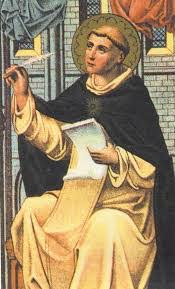HOMILY CHRISTMAS SEASON – JANUARY 08th
Three That Testify: Living God’s Testimony
Optional Memorial of St. Raymond of Penyafort
(1 Jn 5:5-13; Ps 147; Lk 5:12-16)
************************************************
And this is the testimony: God gave us eternal life, and this life is in his Son.
That sentence from the first reading hints at the dynamic energy and power of God at work in our lives through Jesus Christ. We are invited to experience eternal life by living this “testimony of God.” That begs the question – how does one live this testimony, and what is the meaning of the mysterious statement, “There are three that testify: The Spirit and the water and the blood, and these three agree”?
May I suggest the message for us as we prepare to celebrate the Baptism of the Lord this Sunday is that we can experience eternal life through faith (water), love (blood) and self-awareness (the Spirit).
The first reading begins by proclaiming that the one who conquers the world is the one who believes that Jesus Christ is the Son of God. That is perhaps the easiest of these three testimonies to live, yet still demanding. We are to put our complete faith in our Trinitarian God – the Father, Jesus the Son of God, and the Holy Spirit. That faith must lead us to trust God totally, to surrender our lives to God, and to be open to the transformative power of that faith.
The more challenging testimony is the blood. That blood can symbolize the selfless unconditional love that we are to give to others, as Jesus gave himself to us. Genuinely caring for others, and sharing life with them in trust, understanding, and forgiveness are all ways to love others.
The gospel account adds another dimension to how God love us – healing. Healing was central to the ministry of Jesus – here through word and touch. Jesus touches anyone who comes to him with faith, with his healing power. We are all in need of healing to a greater or lesser degree, in one area of our personality and being or other. Blessed are those who come to him aware of their need and trusting in him for that healing, which will take place through the power of the Holy Spirit.
That, incidentally, is a prayer that will always be answered. God wants to pour the Holy Spirit into our hearts and lives, and will never refuse our request for that Spirit. As Luke states in his teaching on the Our Father, if we as parents know to give good things to our children, how much more so will our heavenly Father give the Holy Spirit to those who ask for it.
The Spirit that is truth is, I think, the most challenging aspect of John’s teaching about eternal life. The world that we are to conquer is not out there, but within us – our sin and sinfulness. Truth has to do with our own inner truth. Do we really know ourselves as we are? Have we accepted ourselves as we are? Can we see ourselves as others see us? Are we aware of our need for forgiveness? And are we in touch with our need for healing especially of our sinfulness, that which makes us sin, our painful emotions like insecurity, anger or envy; our negative attitudes like false pride, stubborn self-righteousness, or need for power and control? The more I observe what is happening in our world and in our church, I become more and more convinced that the need for power over others, and the compulsion to control others is like a plague infecting so much of our lives.
John the Baptist is a good example for us. First of all, he recognized Jesus and leapt for joy in his mother’s womb at the very presence of Jesus. Then he had the faith to proclaim Jesus as the long-awaited Lamb of God who alone could take away the sins of the world. John could only baptize with water for repentance; he could not forgive or take away sins. Only Jesus who would baptize with the Holy Spirit could to that – forgive and heal. Most of all, John was humble – he had no desire for power or control and could easily say that he was not worthy to undo the thongs of Jesus’ sandals. Would that we could be like John the Baptist, and humbly let go of any clinging to possessions, prestige, power and control.

St Raymond of Penyafort
Today the church honours St. Raymond of Penyafort, who is particularly noteworthy for his contribution to canon law, the laws and regulations governing the Church. Raymond was a professor of philosophy by the age of 20, and then went on to study canon law. As a Dominican priest, he travelled through Spain preaching to Moors and Christians. In 1235, having been confessor to Pope Gregory IX, he was appointed archbishop of Tarragona, resigning soon after because of illness. Raymond was responsible for organization of papal decrees, which became the basis for the original code of canon law. His writings were often used as guidelines for the administration of the sacrament of penance (reconciliation). A contemporary of Thomas Aquinas, he encouraged Thomas to write the Summa Contra Gentiles. Canonized in 1601, he is patron saint of lawyers, including canon lawyers.
The Eucharist is both a deep act of faith in Jesus as Son of God, present in Word, Sacrament, and especially each other, and also a mandate to go out and express our faith in unselfish acts of love and blessings.
So remember, there are three that testify: the water and the blood and the Spirit. Let us place our complete trust in Jesus as Son of God, love others as he loved us, learn to love and forgive ourselves, and live that testimony of God that we might enjoy eternal life here and now.



